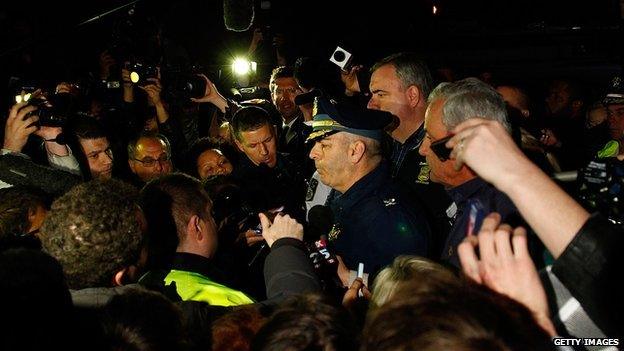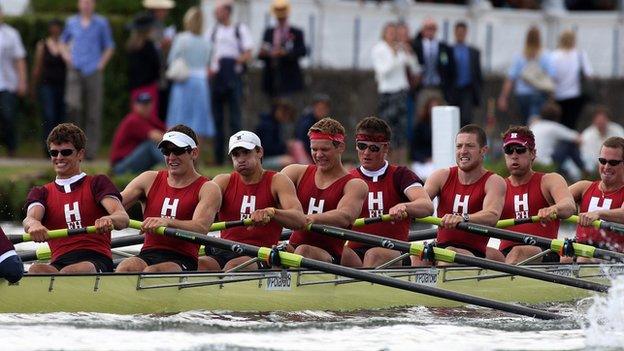Journalistic ethics at internet speed
- Published
- comments

The Boston Marathon bombings brought out the best - and worst - of modern journalism
Several weeks ago, I read a New York magazine report, external that Harvard University's Kennedy School of Government would soon require incoming students to attend a class on "checking their privilege".
Having just covered the controversy over Princeton freshman Tal Fortgang's essay on why he refused to apologise for his privilege, it seemed like the perfect topic for a follow-up blog post - and I was not alone. Dozens of media outlets - in print, online and on television - jumped on the story.
Conservative writers, in particular, seemed to relish citing yet another example of left-wing ivory tower political correctness.
The problem was that - when contacted by the BBC - Harvard denied having agreed to any such training programme. Although several later reports corrected the original New York magazine story, they were far outnumbered, external by those touting Harvard's mandatory "privilege class".
That particular genie was out of the bottle, and there apparently was no getting it back in.
All of this had me wondering about the danger presented by the modern world of online opinion journalism: namely the consequences of the pressure to produce reactions and opinions at greater and greater speed.
Being first is rewarded by increased web traffic, which tends to encourage snap (shallow?) judgements and a failure to adequate check the veracity of sources.
I asked journalist and Harvard University lecturer Jeffrey Seglin, external for his thoughts on the topic. Mr Seglin writes a weekly syndicated column on ethics and is the author of The Right Thing: Conscience, Profit and Personal Responsibility in Today's Business. Here's an edited portion of his reply:
Are the pressures of the modern internet-connected media a problem? Was it ever an issue in the slower-paced past, or is it an unavoidable consequence of the nature of today's journalism?
There has always been a pressure to produce faster than the next guy. We can see this dramatically at play in the historic footage of the news reports covering the John Kennedy shooting in Dallas.
In 1963 the technology obviously wasn't as advanced as today, so you can see NBC's Frank McGee and Chet Huntley fumble with a contraption to allow Robert MacNeil, another reporter on the other end of the phone, to be heard on the air. McGee regularly says throughout the report that it's important to get the facts correct, but there is a scramble among all the networks to gather information.
Our thinking might be that a swift Twitter feed and the ability to transmit visuals digitally quickly helps speed the news to the viewer. But the danger of trying to report first was witnessed during the Boston Marathon bombings last year. Cable news reporters seemed to be basing on-air comments on their live Twitter feed, only to find out that the information was incorrect.
The FBI was able to put out photos of the suspects, but then the New York Post was also able to put photos of the wrong suspects on its cover. Technology worked to get information more swiftly, but it turned out to be wrong.
Fast, in other words, doesn't always equal right.
A related issue that technology brings on is the rapid dissemination of information once it is posted. Some outlet speeds to post a story, gets the facts wrong and corrects the facts, but then other outlets have pounced on the original information so that factually incorrect information goes out all over the place.
A graduate student pointed out one such incident last year when President Obama awarded the Medal of Freedom to several recipients. The initial report online in the New York Times was that the astronaut Sally Ride was awarded the medal posthumously. But the newspaper (and others) identified her as having "died in the Challenger explosion".
This, of course, is incorrect, and whoever reported it had confused Sally Ride, who died of pancreatic cancer in 2012, with Christa McAuliffe, who died in the Challenger explosion in 1986. The Times might have corrected its online post, but the error is still out there (see, for example, this story, external, where the caption under Sally Ride's partner carries the misidentification).
Making mistakes is, and always has been, unavoidable. But losing sight of the importance of verifying and checking facts and doing good journalism - whether in a news report or an opinion column - is as much, if not more so, a culprit of erroneous information getting posted or broadcast or printed as is the speed with which we can now get the information.
It's the journalist's responsibility to try to verify and check out what her or his sources tell him. The old saw, "If your mother tells you she loves you, check it out", is never truer than it is today.
The pressure is to check it out faster since the information is coming faster, but not receiving corroboration or confirmation in a timely manner, is never an excuse for going to air or print or post with knowingly unchecked facts.
If journalists do have an obligation to be measured and deliberate in their writing, how do they avoid being swamped by others who are less concerned with these sorts of things?
If another outlet can be faster and get the story right, it deserves accolades. But if in the need for speed, erroneous information gets reported, it tarnishes the image of that outlet. During the Marathon Bombing reportage, for example, after several errors were reported on-air by the major cable news network, the local sources of information became the go-to sources. The local news broadcasts - and, in particular, the Boston Globe and its print and online coverage - provided far more thorough and thoughtful reporting. (Full disclosure: a former student was part of the team at the Globe that won the Pulitzer for breaking news this year for its bombing coverage.)
If a news outlets becomes known as both swift to report when possible but more often than not accurate in its reportage, that seems to be a positioning that will draw viewers and readers.
The pressure to be first might always be there, but I'm not sure it's as much of an either/or situation. Getting the news and getting the news right seems more important than being the first.
- Published16 May 2014
